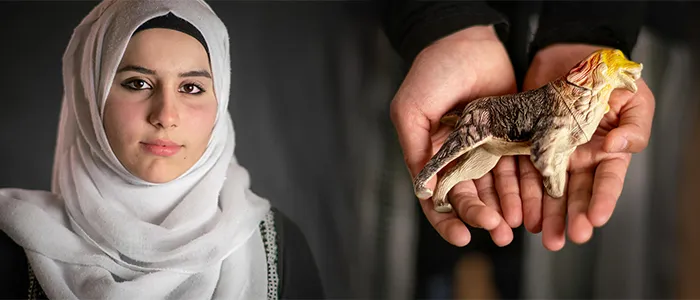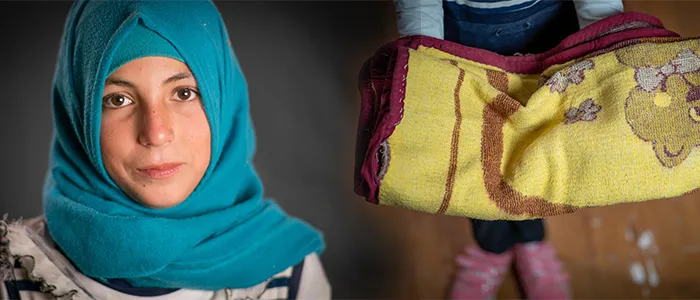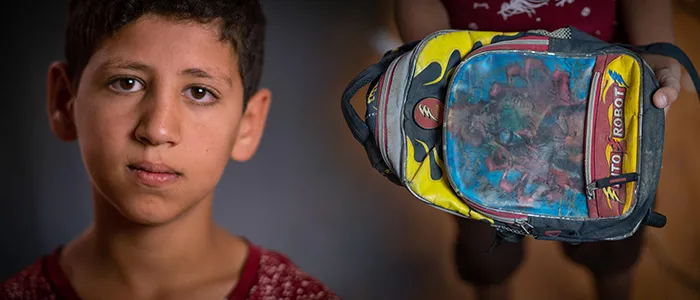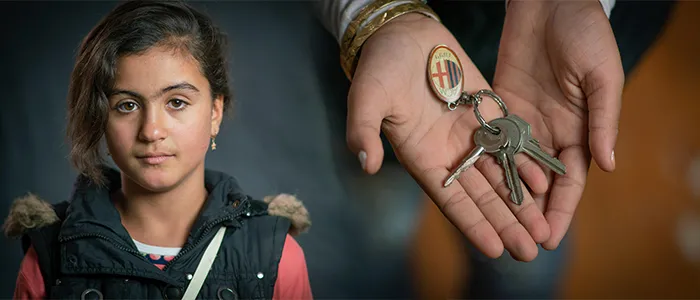Objects I Carried With Me: Stories from Syrian Children
The Syrian Civil War began in 2011, and on March 15, we recognize the 8th year-mark of the conflict.
From that day, and every day since, the war in Syria continues to affect an entire generation of children. 5.6 million children in Syria are in need of humanitarian assistance to meet their most basic survival needs as well as another 2.5 million children living as refugees outside Syria. Camps have become homes, life before war is only a memory.
For many children, objects they brought with them from their homes in Syria to the camps have become repositories for these memories – a way to remind themselves of what life was like before the conflict began.
Syrian Children Need Your Help
“I was thinking he would protect me”

“I brought this dog,” says Shatha, age 15. “I was little when we left Syria – only 8 or 9 years old. I don’t remember much. When we had to leave, I took him with me, I was thinking he would protect me. I had so many toys to choose from but he was my favourite – I played with him a lot.”
“I remember being on the bus here and sleeping a lot. I held him the whole way to Za’atari. The camp was full of tents back then and life was hard, really hard. I kept getting lost. I never let go of my dog in those first days so he could protect me.”
Shatha wants to be a lawyer when she grows up to protect herself and others. “My toy dog will always be with me. I’ll tell my children my whole life story and his – because it’s the same as mine.”
“I was scared but my Mom held me.”

“This is my blanket. When I was little and it was my birthday, my grandmother bought it for me,” says Nour, age 12. “I remember that we had to flee because there was bombing. It was night time. That’s why we came here.”
“[My blanket] protected me against the cold and the rain. I was scared but my Mom held me.”
Nour wants to be a teacher when she grows up. Her favourite subject is Social Studies because she likes it and her teacher. “I still have feelings when I cover myself in this blanket. I feel sadness thinking about the old beautiful days in Syria. But I also feel protected and safe… I’m going to keep it as long as I can.”
“I was in first grade and my Dad gave me this schoolbag.”

“I was in first grade in Syria and my Dad gave me this schoolbag. I was only little then but now I’m in the sixth grade,” says Qusai, age 13.
Although the schoolbag is now too small for him, he keeps it safe. “It’s important to me because my father gave it to me as a gift and I remember him by it. Also because it is from my country.”
He still has happy memories from life in Syria, including going to school. “I used to feel really happy when break came and I could go to the shop. I remember playing in the schoolyard – my friends chasing me and me chasing them.”
Qusai has no plans to give up the old schoolbag. “I will keep this schoolbag forever. I will tell my children my father gave this to me and I kept it safe for all these years to show you.”
“I’m so far away from home.”

“These are my house keys. I brought them with me because when we go back to Syria, I’m going to be the one who opens the door,” says Rudaina, age 11.
“My parents tell me that Syria is beautiful. I was so little that I don’t remember… We once had a home but now we live in a caravan. I feel so sad when I hold the keys because I’m so far away from home.”
Childhood in Danger
The violence and continued displacement is putting Syrian children in danger. Risk of being injured or separated from their families, lack of basic needs and medical attention are all concerns facing the people of Syria right now.
“Humanitarian assistance and protection are not a privilege nor a luxury; they are a fundamental right of every Syrian boy and girl… If we collectively fail that duty, children will continue paying the heaviest price of a war not of their making, putting the world to shame,” say Geert Cappelaere, UNICEF Regional Director for the Middle East and North Africa.
